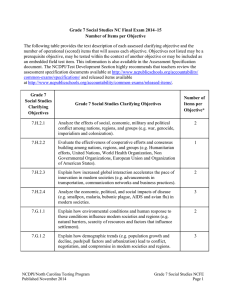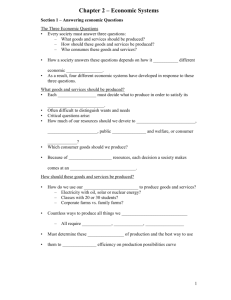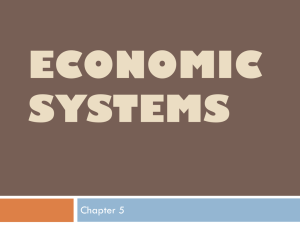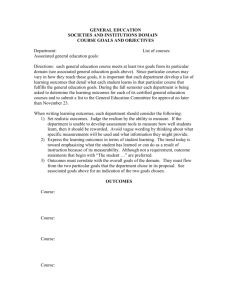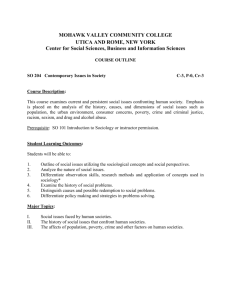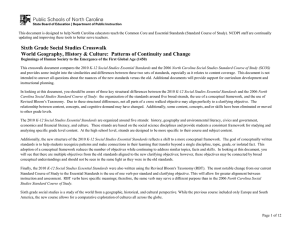The following table provides the text description of each assessed... number of operational (scored) items that will assess each objective.... Grade 7 Social Studies NC Final Exam 2015–16
advertisement
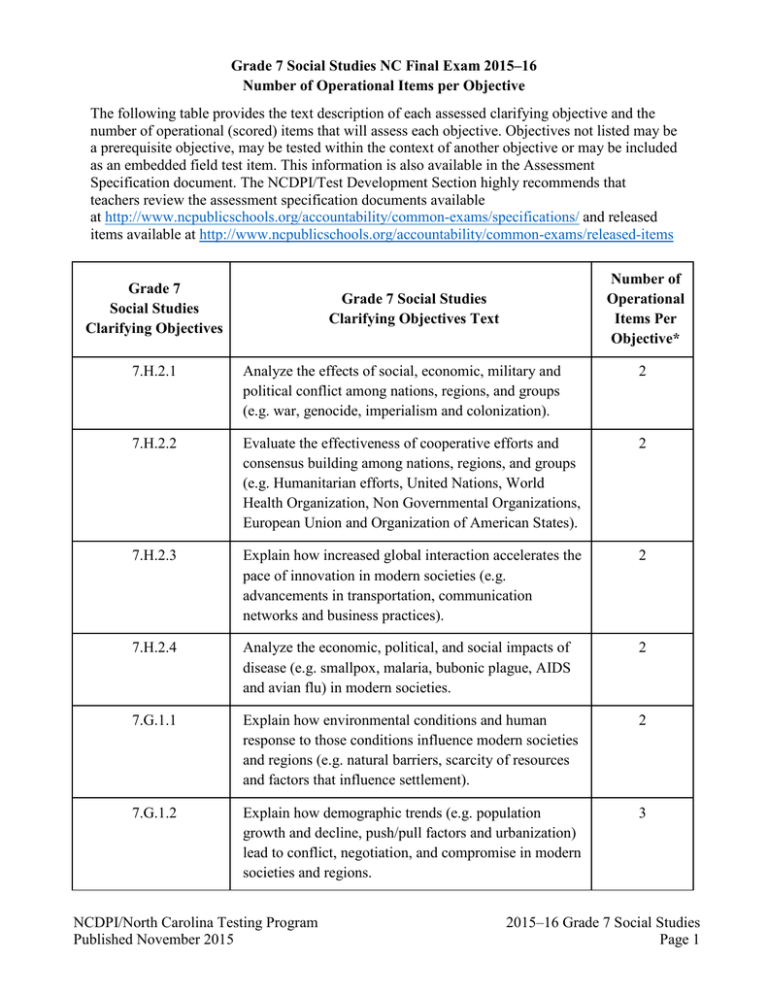
Grade 7 Social Studies NC Final Exam 2015–16 Number of Operational Items per Objective The following table provides the text description of each assessed clarifying objective and the number of operational (scored) items that will assess each objective. Objectives not listed may be a prerequisite objective, may be tested within the context of another objective or may be included as an embedded field test item. This information is also available in the Assessment Specification document. The NCDPI/Test Development Section highly recommends that teachers review the assessment specification documents available at http://www.ncpublicschools.org/accountability/common-exams/specifications/ and released items available at http://www.ncpublicschools.org/accountability/common-exams/released-items Grade 7 Social Studies Clarifying Objectives Number of Operational Items Per Objective* Grade 7 Social Studies Clarifying Objectives Text 7.H.2.1 Analyze the effects of social, economic, military and political conflict among nations, regions, and groups (e.g. war, genocide, imperialism and colonization). 2 7.H.2.2 Evaluate the effectiveness of cooperative efforts and consensus building among nations, regions, and groups (e.g. Humanitarian efforts, United Nations, World Health Organization, Non Governmental Organizations, European Union and Organization of American States). 2 7.H.2.3 Explain how increased global interaction accelerates the pace of innovation in modern societies (e.g. advancements in transportation, communication networks and business practices). 2 7.H.2.4 Analyze the economic, political, and social impacts of disease (e.g. smallpox, malaria, bubonic plague, AIDS and avian flu) in modern societies. 2 7.G.1.1 Explain how environmental conditions and human response to those conditions influence modern societies and regions (e.g. natural barriers, scarcity of resources and factors that influence settlement). 2 7.G.1.2 Explain how demographic trends (e.g. population growth and decline, push/pull factors and urbanization) lead to conflict, negotiation, and compromise in modern societies and regions. 3 NCDPI/North Carolina Testing Program Published November 2015 2015–16 Grade 7 Social Studies Page 1 7.G.2.2 Use maps, charts, graphs, geographic data and available technology tools (i.e. GPS and GIS software) to interpret and draw conclusions about social, economic, and environmental issues in modern societies and regions. 3 7.E.1.1 Explain how competition for resources affects the economic relationship among nations (e.g. colonialism, imperialism, globalization and interdependence). 3 7.E.1.2 Explain the implications of economic decisions in national and international affairs (e.g. OPEC, NAFTA, G20, WTO, EU and economic alliances). 1 7.E.1.3 Summarize the main characteristics of various economic systems (e.g. capitalism, socialism, communism; market, mixed, command and traditional economies). 2 7.E.1.4 Explain how personal financial decision-making impacts quality of life (e.g. credit, savings, investing, borrowing and giving). 2 7.C&G.1.1 Summarize the ideas that have shaped political thought in various societies and regions (e.g. Enlightenment and Scientific Revolution, democracy, communism and socialism). 4 7.C&G.1.2 Evaluate how the Western concept of democracy has influenced the political ideas of modern societies. 1 7.C&G.1.4 Compare the sources of power and governmental authority in various societies (e.g. monarchs, dictators, elected officials, anti-governmental groups and religious, political factions). 3 7.C.1.1 Explain how culture unites and divides modern societies and regions (e.g. enslavement of various peoples, caste system, religious conflict and Social Darwinism). 4 7.C.1.2 Explain how cultural expressions (e.g. art, literature, architecture and music) influence modern society. 1 *Objectives not listed may be a prerequisite objective, may be tested within the context of another objective or may be included as an embedded field test item. NCDPI/North Carolina Testing Program Published November 2015 2015–16 Grade 7 Social Studies Page 2
